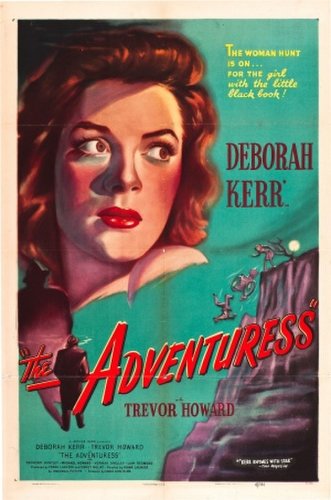

In Devon in June 1944, sunset would be after 10 pm (Double Summer Time), and indeed when the clock strikes 9 and Bridie suddenly ends her date with David we see them moving against a daytime sky.
Yet in the prisoner scene occurring simultaneously, it's fully dark.
When David takes Bridie for a walk on their first date, she is wearing a plain dress in the initial wide shot but a striped dress in the closeups.
NYFCC Award |
| Best Actress |
Bridie Quilty (Deborah Kerr) grew up on her late father's war stories about his battles in the Irish independence. It's 1944 before D-Day and Ireland is a neutral country.
I would have loved to give I See A Dark Stranger a higher star rating than my 7 but it can't quite satisfy due to it's ambiguity. Is it it serious or not?
I SEE A DARK STRANGER is an interesting little spy thriller from the period, quite unusually featuring an anti-heroine as the lead character. Later Hollywood starlet Deborah Kerr puts in a top job as a committed young Irish nationalist who ends up spying for her side during WW2, romancing Trevor Howard as part of the scheme.
Quite good - intriguing and amusing. Starts slowly, and without any apparent focus, but gets better and better as it goes on.
Deborah Kerr (as in star) as the trailer says is usually thought of in almost matronly fashion since she's brought strength and dignity to so many roles as a veteran performer. Here you see her in younger days.
Deborah Kerr plays an extremely naive young Irish girl who dreams of joining the IRA but winds up working for the Nazis instead. I see that many other reviewers really like this film, but it doesn't work at all for me.
One of the first films concerning D-Day, this is a very entertaining spy thriller written by Frank Launder (who also directed) and Sidney Gilliat. It is the only film that I ever seen dealing with the issue of the Irish Free State's neutrality in World War II, albeit somewhat indirectly, and the only one that I am even aware of so this Irishman found it very interesting on that score, particularly since my PhD thesis concerns Irish society and the way that it shaped Irish law from the 1920s to the 1940s.
Though many Irishmen voluntarily joined the British forces in World War II, the country's official neutrality must have aroused a great deal of resentment and anger among the British fighting for their lives at home and abroad. This movie could be seen as an attempt at reconciliation, not by trying to justify the Irish policy as a response to centuries of British oppression but by characterizing Irish super-patriots as eccentric and silly.
Bridie O'Debrah Kerr is a feisty, hot blooded, tempestuous, Irish lass who leaves her small village at 21 to go to the big city to join the IRA. She gets rebuffed and pours paint over a statue of Oliver Cromwell because she is feisty and hot-blooded.